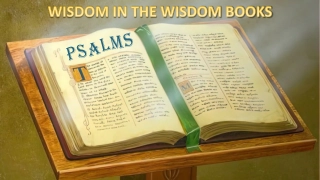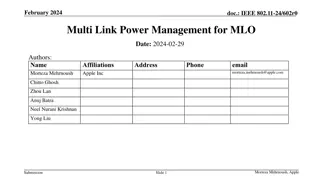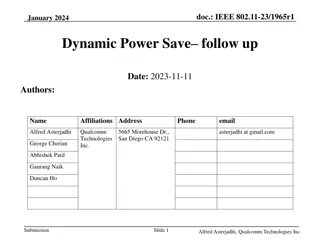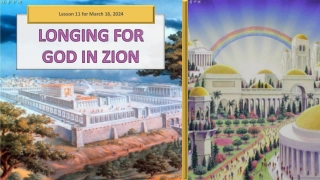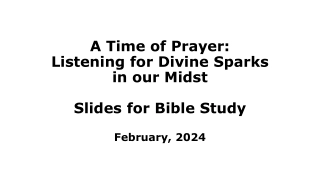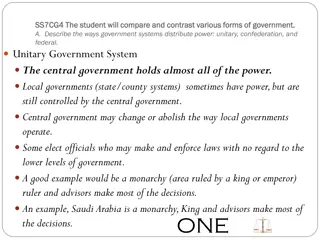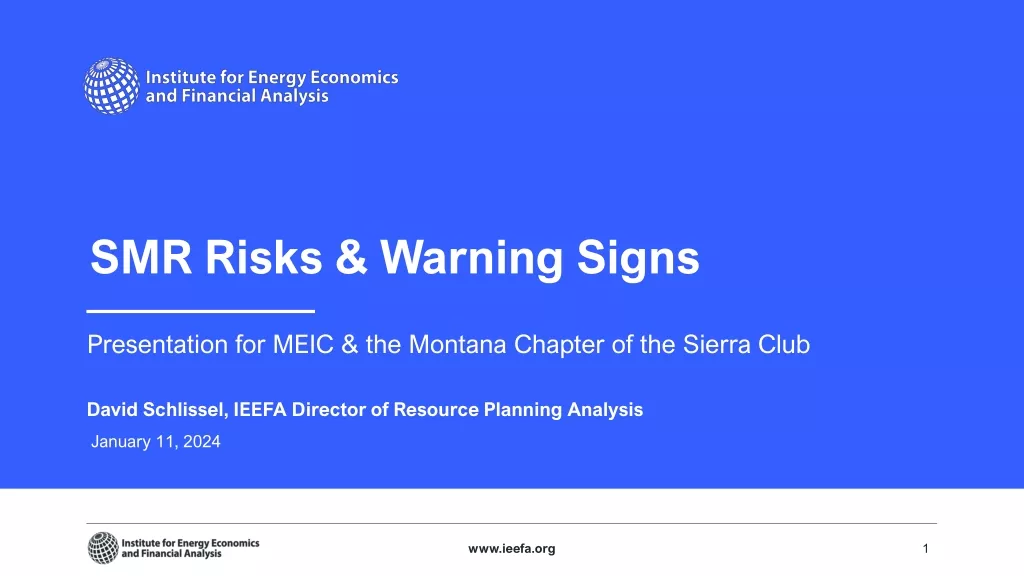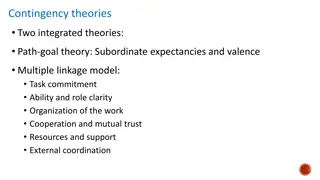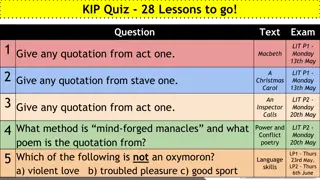The Power of Praying with Psalms
Discover the depth and significance of using Psalms as prayers in various life situations. Learn how Psalms can guide your expressions of praise, gratitude, lament, forgiveness, and seeking divine intervention. Explore the wisdom of praying during difficult times, moments of despair, and when facing challenges with faith and trust in God's merciful love.
Download Presentation
Please find below an Image/Link to download the presentation.
The content on the website is provided AS IS for your information and personal use only. It may not be sold, licensed, or shared on other websites without obtaining consent from the author. Download presentation by click this link. If you encounter any issues during the download, it is possible that the publisher has removed the file from their server.
Presentation Transcript
TEACH US TO PRAY Lesson 2 for January 13, 2024
Now it came to pass, as He was praying in a certain place, when He ceased, that one of His disciples said to Him, Lord, teach us to pray, as John also taught his disciples' (Luke 11:1)
God provided Israel with a prayer book: Psalms. It expresses the deepest feelings with which its authors addressed the King and Lord of their lives. Without a doubt, we will find in those feelings a reflection of our own feelings. If you are sad, read a Psalm. If you are distressed, read a Psalm. If doubts attack you, read a Psalm. If you need forgiveness, read a Psalm. If your heart overflows with gratitude, read a Psalm. If you have found a moment of happiness, read a Psalm. Pray using Psalms (James 5:13). Pray in difficult times (Psalm 44). Pray in times of despair (Psalm 22). Pray between doubt and hope (Psalm 13). Pray for restoration (Psalm 60).
PRAY USING PSALMS The use of Psalms as songs of praise is evident (1Chr. 16:9); but it is not its only use. Each Psalm is a prayer to God that should be used according to the needs of the moment: to lament; to give thanks; To ask for forgiveness; to seek divine direction; to remember history; to praise; to show anger... How can we use the Psalms as prayers? If there is something in the psalm that challenges you, reflect on it Think about how the psalm can help you express your feelings to God Observe the way the psalmist addresses God Compare your situation with the psalmist's experience Relate the psalm to Jesus and his work of salvation Ask God to put his Word in your heart and mind Discover the reasons for his prayer Read the psalm and pray
PRAY IN DIFFICULT TIMES Yet for Your sake we are killed all day long; We are accounted as sheep for the slaughter (Psalm 44:22) Do you feel that God treats you unfairly by allowing you to experience difficult situations that you do not deserve? Maybe yes, or maybe not. But, if so, would you express it in a prayer, whether public or private? The psalmist did not hesitate to do so. The people of Israel were being plundered, exiled and murdered. And they had done nothing to deserve it! They had not turned away from God nor sinned against Him (Ps. 44:9-19). Like the psalmist, we should feel free to express our feelings and emotions to God in prayer. Let's present reality as we live it. Let us recognize that He can get us out of the most complex situations (Ps. 44:1-8), even if we do not understand why He does not do it now. Above all, let us not doubt that, even in the midst of problems and difficulties, God is loving and merciful (Ps. 44:26).
PRAY IN MOMENTS OF DESPERATION Be not far from Me, for trouble is near; For there is none to help (Psalm 22:11) Imagine Jesus praying with the words of Psalm 22:1, while his body hangs on the cross (Ps. 22:14); his hands and feet pierced (Ps. 22:16); surrounded by a threatening crowd (Ps. 22:7-8); observing the soldiers dividing his clothes (Ps. 22:18); thirsty, waiting for the moment of his death (Ps. 22:15); desperate. Your situation may not be as agonizing as that of Jesus, but you have surely felt, like Him, desperate at some point. In those moments, Psalms teach us to pray, looking beyond our current situation, and see by faith the restoration of our lives. See by faith the moments in which we will return to praise God with joy and gladness (Ps. 22:25-26). In times of despair, we can be sure that God hears us. He cares about our affliction and sees us, even though we do not see Him (Ps. 22:24).
PRAY BETWEEN DOUBT AND HOPE Has God forgotten me? Sometimes, our perception is yes. The psalmist expressed it with great clarity. But he went beyond the doubts and showed us his hope. Psalm 13:1-2 Psalm 13:3-4 Psalm 13:5 Psalm 13:6 He rebukes God for his indifference toward him: How long? He asks him to respond so that his enemies do not rejoice. He shows his complete trust in God, and trusts in his salvation. Finally, he breaks into songs of praise. When in doubt, we must ask that the Spirit enlighten our eyes, that is, help us clear our doubts (Ps. 13:3). This psalm shows us that it is also lawful for us to demand that God act in prayer. We must be sure that the promises contained in Psalms are for us too.
PRAY FOR RESTORATION Lamentation psalms like 60 are prayers expressed in moments of physical, psychological or spiritual pain (or all together). They help us to be aware that suffering is part of the experience of both the just and the unjust. They also help us understand that God is in control, and that He will deliver us at the right time (Ps. 60:5). Our suffering helps us to be compassionate toward those who suffer, just like the psalmist who, seeing the world shaken, pleads with God: heal his brokenness, because he wavers (Ps. 60:2). Above all, this psalm teaches us: To trust fully in God (Ps. 60:11) To exalt him before the world (Ps. 60:4) To be instruments in his hands: In God we will do mighty things (Ps. 60:12)
Darkness and discouragement will sometimes come upon the soul, and threaten to overwhelm us; but we should not cast away our confidence. We must keep the eye fixed on Jesus, feeling or no feeling. We should seek to faithfully perform every known duty, and then calmly rest in the promises of God. [ ] We may not feel today the peace and joy which we felt yesterday; but we should by faith grasp the hand of Christ, and trust Him as fully in the darkness as in the light. EGW (Messages to young people, pg. 102)






